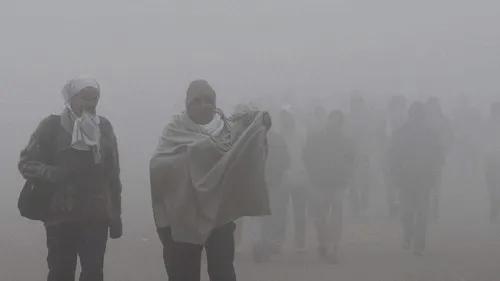New Delhi: A team of researchers from IISER Mohali has uncovered the secrets behind the cold wave conditions in North India. In their study, which was published in the journal Weather and Climate Extremes and led by Professor Raju Attada they emphasize that the main cause of the freezing weather is the infiltration of dry air from the Siberian high.
The Siberian High is a weather phenomenon characterized by an accumulation of cold and dry air in northeastern Eurasia between November and February. It plays a role in shaping North Indias winter climate. The study investigates the causes and worrisome patterns associated with this ongoing cold wave.
By analyzing normalized minimum temperature anomalies the research team identifies cold waves when there are four or more consecutive days with a standard deviation below minus 2. On Wednesday Delhi and other northern regions experienced cold accompanied by rainfall and snowfall in various areas. According to the India Meteorological Department (IMD) Delhi recorded a temperature of 18.6 degrees Celsius four degrees below average for this season and a minimum temperature of 7.3 degrees Celsius slightly lower than normal.
The study attributes this prolonged wave to the intrusion of cold and dry air, from the Siberian High, which is intensified by atmospheric blocking caused by high latitude weather systems.
This phenomenon leads to the build up of air resulting in extremely chilly conditions in northern India.
The research team, which includes KS Athira from IISER Mohali and V Brahmananda Rao from the National Institute for Space Research, Brazil mentions that this years winter atmospheric blocking has intensified waves causing them to persist longer from December to January.
By analyzing data from 1982 to 2020 the study highlights a decrease in the occurrence, duration and intensity of cold wave events during this period. This decline is attributed to increasing winter temperatures due to global warming and a reduction in the number of western disturbances (WDs) which are storms originating from the Caspian or Mediterranean Sea that bring non monsoonal rainfall to northwest India.
The researchers emphasize the impacts of cold waves on human health as well as agriculture, livestock and transportation. The risk of hypothermia and frostbite among groups underscores the need for clear policies, at different administrative levels.
Attada stresses the significance of understanding features and dynamics for accurate predictions of cold wave events. They urge actions aimed at saving human lives during such weather conditions.
—Input from Agencies

